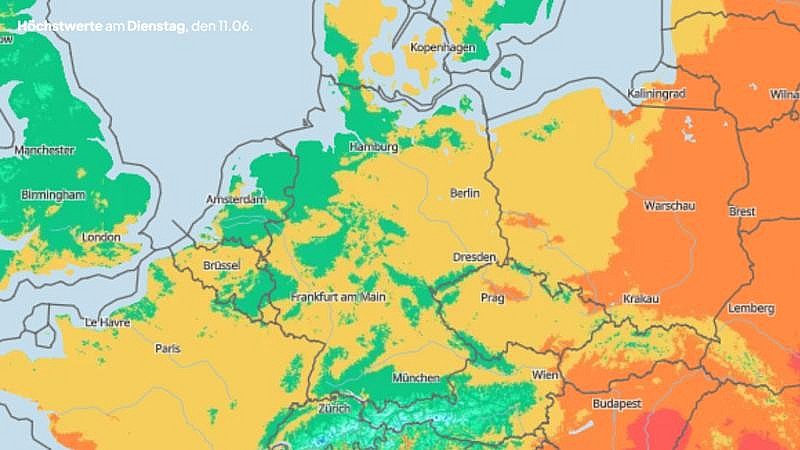Top 10 Free Websites and Apps to Forecast Germany Weather
| Table of Contents |
If you're new to a German city for work, travel, or football games and don't know where to start to learn about the weather, here's a list of weather apps and websites that you can use. the most reputable and widely known data.
Whether you're going to a football game, flea market, or on vacation, it's important to know the weather in advance of your trip to Germany. Fortunately, the weather in Germany is generally stable, though it can occasionally be unpredictable, particularly near the coast or in the mountains. Unexpected storms, floods, avalanches, or heat waves can happen depending on the time of year and location.
Learn more: Public Health Advice (WHO) for Visitors Attending EURO 2024 in Germany
Most smartphones have weather apps, but they might not be as helpful as the following websites and apps that KnowInsiders suggests:
 |
| Best Weather Sites and Apps in Germany |
A Comprehensive Guide of German Weather for Visitors/Residents
Germany is a nation of varied climates, cultures, and landscapes. The weather and temperature where you visit will vary depending on when and where you go.
Four Main Climatic Zones in Germany
• North and northwest Germany
The states of Schleswig-Holstein, Lower Saxony, Bremen, Hamburg, and North Rhine-Westphalia are included in this region. The Atlantic and North Seas, which deliver humid, mild air masses, have an impact on it. Here, the weather is frequently overcast, gusty, and wet, particularly in the winter. The average annual precipitation is approximately 700 mm, and the average annual temperature is approximately 9°C.
• East Germany
The states of Mecklenburg-Vorpommern, Brandenburg, Berlin, Saxony-Anhalt, Saxony, and Thuringia are all included in this region. The continental climate, which brings dry, cold air masses from the east, has an impact on it. Here, the summers are hotter and the winters are colder, with more extreme weather. There is about 8.5°C of average annual temperature and 600 mm of average annual precipitation.
• Central and southern Germany
The states of Hesse, Rhineland-Palatinate, Saarland, Baden-Württemberg, and Bavaria are included in this region. In addition to the continental climate, the Mediterranean climate—which draws warm, humid air masses from the south—also has an impact. There is more variation in the weather here, with mild summers and winters. The average annual precipitation is approximately 800 mm, and the average annual temperature is approximately 9.5°C.
• Alpine and mountainous regions
The Alps and other southern German highlands are included in this region. The alpine climate, which brings cold, snowy air masses from the north, has an impact on it. Here, summers are shorter and winters are longer, making for more extreme weather. The average annual precipitation is approximately 2000 mm, and the average annual temperature is approximately 5°C.
► Download PDF file of "Public health advice for travellers attending UEFA EURO 2024"
 |
| Germany Weather Forecast Today |
German Weather Per Season
Germany experiences four distinct seasons, as previously mentioned: spring, summer, autumn, and winter. Every season has unique qualities and variances based on the area. Here's a quick rundown of what to anticipate in each season:
• Spring
In Germany, springtime extends from March to May. The season is changing, with the temperature progressively getting warmer and brighter. With abrupt fluctuations in temperature and precipitation, it can also be erratic. Springtime temperatures can vary from 0°C to 20°C, depending on the location and month. On average, they are about 10°C.
In 1970, Germany experienced its coldest spring on record, with an average temperature of just 5.7°C. In 2007, Germany experienced its warmest spring on record, with an average temperature of 11.4°C.
• Summer
In Germany, the summer months are June through August. With long days and short nights, it is the warmest and sunniest season. It can, however, also be stormy and humid, with sporadic heat waves and thunderstorms. Summertime temperatures typically hover around 18°C, though they can vary depending on the month and location by as much as 10°C to 30°C.
In 1816, Germany experienced its coldest summer on record, with an average temperature of just 13.4°C. This resulted from Mount Tambora's eruption in Indonesia, which altered the climate worldwide. In 2003, Germany experienced its warmest summer on record, with an average temperature of 19.7°C.
• Autumn
In Germany, the autumn season runs from September to November. It's a season of transition once more, with progressively cloudier and colder weather. With mild temperatures and golden foliage, it can also be enjoyable and colorful. Autumn temperatures can vary from 0°C to 20°C, depending on the location and month. On average, they are about 10°C.
With an average temperature of just 6.8°C, 1912 was the coldest autumn on record in Germany. In 2006, the average autumn temperature in Germany was 11.9°C, the warmest autumn ever recorded.
• Winter
Germany experiences winter from December through February. With short days and long nights, it is the coldest and darkest season. With Christmas markets and winter sports, it can also be joyous and wintry. Winter temperatures can vary from -10°C to 10°C, depending on the location and month, with an average of 1°C.
In 1962–1963, Germany experienced its coldest winter on record, with an average temperature of -4.6°C. In 2006–2007, Germany experienced its warmest winter on record, with an average temperature of 4.4°C.
Top Best German Weather Websites and Apps
For a precise forecast, it is logical to obtain it from a local source, correct? These German weather apps/websites are not only more accurate, but they are also typically in German, providing a convenient opportunity for you to practice your language skills.
1. DWD WarnWetter
Free Website: https://www.dwd.de/DE/wetter/warnungen_gemeinden/warnWetter_node.html
Germany's national meteorological service is the Deutsche Wetterdienst (DWD). It provides weather forecasts, warnings, and information to the public, media, and authorities. Climate, environment, and geophysics research and monitoring are also done.
The DWD collects and analyzes weather data using weather stations, radars, satellites, and models. It works with national and international meteorological organizations like the WMO and ECMWF.
DWD was founded in 1952 to replace Reichswetterdienst, founded in 1875. The DWD is headquartered in Offenbach am Main, near Frankfurt. DWD has 6 regional centers, 67 local offices, and approximately 2600 employees.
The official DWD app provides detailed and updated weather warnings, current conditions, and 10-day forecasts. You can also view maps, radar, satellite, webcam, and climate and environmental data. Android and iOS users can download the free app.
2. Wetteronline
Free Website: https://www.wetteronline.de/
With over 3 million locations worldwide, this app offers weather, temperature, and travel information, making it one of the most widely used and comprehensive ones in Germany.
This app/website has an excellent presentation thanks to its user-friendly, intuitive layout, hourly updates for the next 24 hours, and 14 days of weather trends.
Even predictions about the amount of pollen for allergy sufferers and snowfall for fans of winter sports are available on the app/website.
Along with news, videos, and podcasts, you can access maps, radar, satellite, and webcam images. For Windows, iOS, and Android smartphones, WetterOnline is free.
You can purchase the pro version for 9,99 euros, but the free version is accurate enough.
3. Wetter.com
Free Webstie: https://www.wetter.com/
The knowledgeable meteorologists at Wetter.com deliver the most recent weather information via a variety of platforms. If you're too busy to watch their TV channel, you can download the Wetter.com app for iOS and Android from the Google Play Store (weather24). It offers live weather cameras and pollen count forecasts in addition to crucial basic forecast data like temperature, precipitation, and sunshine. While the ad-free version of the app is free, it will cost you some money.
4. Wetter.de
Free Website: https://www.wetter.de/
Wetter.de is a nifty and dependable app that offers hourly forecasts globally and has an easy-to-use interface. You won't have to worry about any unforeseen weather thanks to 14-day previews and severe weather warnings that will help you prepare well in advance. Overall, Wetter.de is a great option for anyone searching for a trustworthy and all-inclusive weather app in Germany.
5. Weather & Radar – Storm radar
Free Website: https://www.rainviewer.com/radars/germany.html
Weather & Radar: Storm radar is a useful and accurate app with a simple interface and practical widgets. The aesthetically pleasing and intuitive interface of this app is one of its main selling points; it can be quite handy during a chaotic storm. Additionally, this app offers cloud density details that are more precise than those found in a lot of other apps. You can get it from the Google store for free.
Top Best International Weather Websites and Apps
For precise forecasts in Germany, a German weather app or website might be your best bet, but if you travel abroad frequently, a weather app with global coverage might be more useful.
6. Accuweather
Free Website: https://www.accuweather.com/
Germany's weather forecasts are precise and comprehensive thanks to the AccuWeather app. You can be sure you're always ready with its hourly and daily weather updates and severe weather alerts. You have a fantastic option for anyone searching for a dependable weather app when you combine those updates with an easy-to-use interface and customizable features.
7. WeatherPro
Free Website: https://www.weatherpro.com/
With updates every three hours, this app offers seven-day forecasts for over 2 million locations worldwide. The app offers global alerts and warning levels for extreme weather in addition to information on temperature, wind, air pressure, precipitation, humidity, UV index, and "feels like" temperatures.
8. Yahoo Weather
Free Website: https://www.yahoo.com/news/weather/
It's simple to understand why this Yahoo weather app won the 2013 Apple Design Award: eye-catching Flickr photos of the weather and your current location offer a minimalist backdrop that can be expanded to reveal more specific information about temperature, wind, precipitation, and a 10-day forecast. It must be the most beautiful weather app available in addition to being accurate.
9. The Weather Channel
Free Website:
An old-time classic, the Weather Channel provides 48-hour and 15-day forecasts, with details on wind speeds, humidity, the UV index and visibility.
10. Yr.no
Free Website: https://www.yr.no/nb
The National Meteorological Institute and the NRK (the Norwegian Broadcasting Corporation) created the straightforward, user-friendly, and trustworthy weather app Yr.no. It is crucial to have trustworthy weather reporting in a nation where extreme weather is a common occurrence.
The application can be downloaded for free and is ad-free. You will receive comprehensive, hour-by-hour forecasts for the next three days as well as a more broad outlook for the next six days. Although radar and humidity charts are sadly absent, it is typically very accurate.
In Conclusion
We have covered a comprehensive guide to German Weather for travelers and residents. From understanding the different seasons and their characteristics, to the varying climates across different regions, we hope you now feel well-informed and prepared for your time in Germany.
Weather reports are never perfect, but these German weather apps/free websties can help you avoid any unexpected downpours and have sunblock ready when you need it. Whether you’re trying to make the best of a holiday visit or making your daily commute, there’s nowhere better to get the most accurate forecast for weather in Germany.
Remember that the weather can change quickly and unexpectedly, so always check the latest forecasts and warnings before you go out. Enjoy the weather, and have a great time in Germany.
FAQs - German Weather
How often does it rain in Germany?
With approximately 800 mm of precipitation on average per year, Germany is a reasonably wet nation. However, the region and the season have an impact on the quantity and frequency of rainfall. In general, the northwest and the Alps have the most precipitation, while the east and the south have the least. Summer is the wettest season and winter is the driest.
With a total of 1076 mm of precipitation, 2002 was the wettest year on record in Germany. With just 483 mm of total precipitation, 1959 was the driest year ever recorded in Germany.
What is the best time to visit Germany in terms of weather?
When it comes to weather, June, July, and August are the best times of year to visit Germany. The average high temperature during these months is between 20 and 30 degrees Celsius (68 and 86 degrees Fahrenheit), which is warm and comfortable. It's also a fantastic time to take in outdoor activities and explore the gorgeous countryside.
Does Germany experience extreme weather conditions?
Even though Germany typically has milder weather than some other nations, extreme weather does occasionally occur there.
Certain regions of Germany may encounter subfreezing temperatures and snowfall in the wintertime.
Heatwaves are common during the summer, when temperatures can occasionally soar above 30 degrees Celsius (86 degrees Fahrenheit). When traveling to Germany, it's a good idea to check the weather forecast and pack appropriately.
Are there any regions in Germany known for specific weather patterns?
Yes, the weather in Germany varies depending on the location.
Coastal regions, like the North and Baltic Seas, typically experience milder summer temperatures and fewer extremes in the weather. On the other hand, the southern areas—especially those in the Bavarian Alps—may endure harsher winters with lots of snow.
Germany's central and eastern regions experience hot summers and chilly winters due to their more continental climate. When organizing your vacation and deciding which areas to visit, it's important to take these variances into account.
How often does the sun shine in Germany?
With an average of roughly 1600 hours of sunshine per year, Germany is a rather cloudy country. Nonetheless, the region and the season have an impact on the quantity and frequency of sunshine. In general, the east and south are the sunniest regions, while the north and west are the cloudiest. Summer is the sunniest season and winter is the cloudiest.
2003 was the sunniest year on record in Germany, with 2125 hours of sunshine overall. With just 1239 hours of sunshine overall, 1987 was the cloudiest year ever recorded in Germany.
 Top 10 Largest Companies In Germany By Market Cap (2024 Update) Top 10 Largest Companies In Germany By Market Cap (2024 Update) Many people identify Germany with its automobiles. Volkswagen and BMW are global trademarks synonymous with excellent quality and solidity. But there's more to it. |
 Top 10 Best Hospitals In Germany 2024/2025 Ranked by Newsweek and Statista Top 10 Best Hospitals In Germany 2024/2025 Ranked by Newsweek and Statista We've chosen ten such hospitals in Germany that are worth getting to know because they welcome overseas patients. Keeping them in mind may allow you ... |
 Top 10 Best Shopping Malls In Germany 2024/2025 Top 10 Best Shopping Malls In Germany 2024/2025 Germany features a few shopping complexes with a large number of world-class luxury brand outlets, despite its relatively unknown shopping environment. You can also go ... |
 Full List of UEFA EURO 2024 Stadiums in Germany Full List of UEFA EURO 2024 Stadiums in Germany As Germany prepares to host UEFA EURO 2024, excitement is building around the stadiums where the action will unfold. Here’s an ultimate guide to ten ... |
 Discover 10 UEFA EURO 2024 Host Cities in Germany Discover 10 UEFA EURO 2024 Host Cities in Germany As UEFA EURO 2024 approaches, football fans and travelers alike are looking forward to exploring the host cities. Each city offers its unique blend of ... |
























